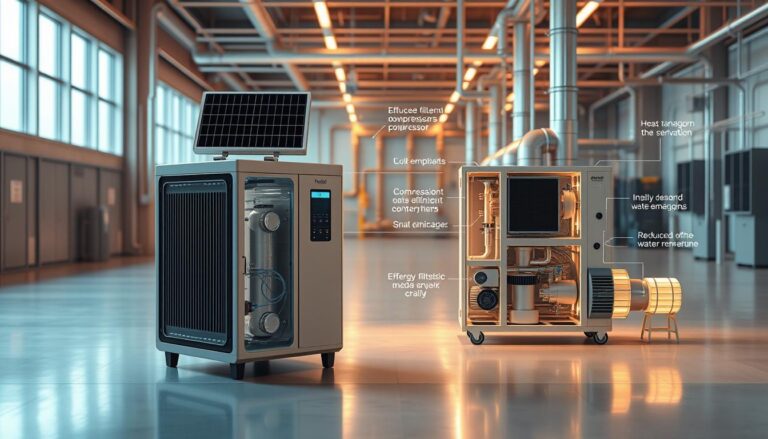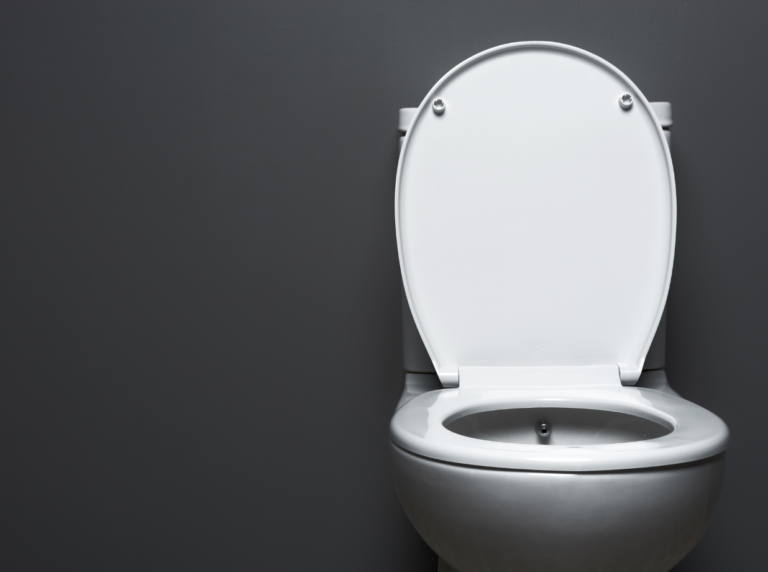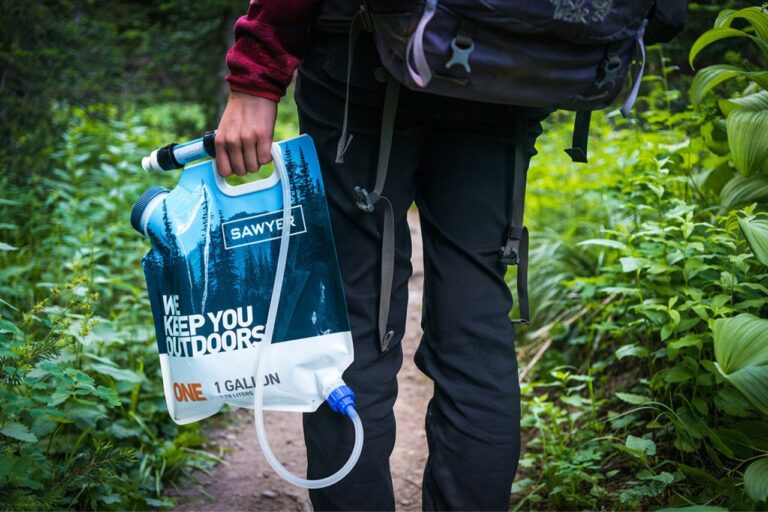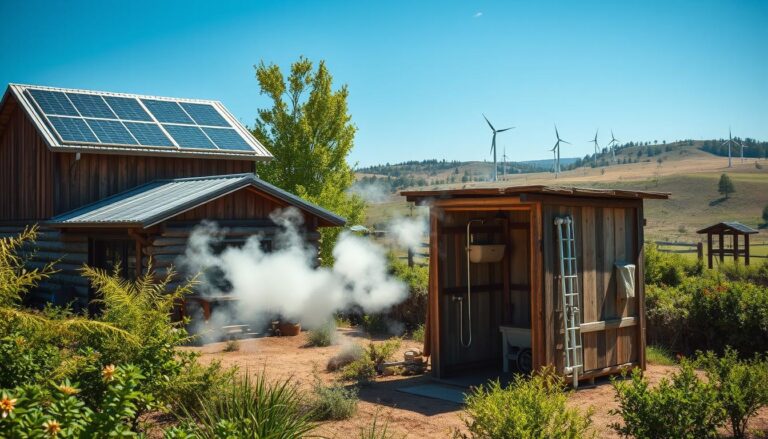Off-Grid Grey Water Solutions: A Guide
Are you aware of the significant impact that effective greywater management can have on reducing your household’s environmental footprint? As households look to adopt more sustainable living practices, off-grid grey water solutions are becoming increasingly important.
Managing greywater effectively not only conserves water but also reduces waste. By reusing and recycling water, homeowners can significantly decrease their water consumption and contribute to a more sustainable future. This guide will explore the benefits of sustainable grey water systems and provide an overview of the topics to be covered, helping you navigate the world of greywater management off-grid.
Key Takeaways
- Understanding the importance of off-grid grey water solutions
- Exploring the benefits of sustainable greywater management
- Learning about eco-friendly methods for reusing and recycling water
- Discovering how to reduce household water consumption
- Understanding the role of greywater systems in sustainable living
Understanding Grey Water in Off-Grid Settings
Grey water, a significant component of household wastewater, requires careful management in off-grid settings. It is generated from various domestic activities and can be reused for irrigation and other non-potable purposes, making it a valuable resource in off-grid water conservation.
What Qualifies as Grey Water
Grey water comes from sinks, showers, and washing machines. It is distinct from black water, which contains fecal matter and is typically discharged from toilets. Grey water may contain soap, shampoo, and food particles, but it is generally considered safe for reuse after proper treatment.
Differences Between Grey Water and Black Water
The primary difference between grey water and black water lies in their composition. Black water contains pathogens and requires more stringent treatment before it can be safely reused or discharged. In contrast, grey water is relatively cleaner and can be treated and reused for various purposes, including irrigation.
Grey Water Composition and Concerns
Grey water composition varies depending on its source. For instance, grey water from kitchens may contain more food particles and oils, while grey water from bathrooms may have higher levels of soap and shampoo. Concerns associated with grey water include the potential for contamination and the need for proper treatment to prevent health risks.
| Source | Typical Contaminants | Reuse Potential |
|---|---|---|
| Sink | Food particles, soap | Irrigation, flushing toilets |
| Shower | Soap, shampoo, hair | Irrigation, garden watering |
| Washing Machine | Detergent, fabric fibers | Irrigation, outdoor uses |
Effective grey water management in off-grid settings involves understanding its sources, treatment options, and potential reuse applications. By adopting appropriate grey water treatment solutions, off-grid households can conserve water, reduce their environmental footprint, and enhance their sustainability.
Benefits of Proper Grey Water Management
Implementing sustainable grey water systems can lead to substantial benefits for off-grid households. By reusing grey water, households can significantly reduce their water waste and promote a more sustainable lifestyle.
Water Conservation Advantages
Grey water reuse contributes to off-grid water conservation techniques by reducing the demand on potable water sources. This is particularly important in off-grid settings where water supply is limited.
Environmental Impact Reduction
Eco-friendly grey water methods help minimize the environmental impact of wastewater by reducing the amount of effluent discharged into the environment. This helps protect local ecosystems and maintain water quality.
Economic Benefits for Off-Grid Living
Effective grey water management can also yield economic benefits for off-grid households. By reusing grey water for irrigation and other non-potable purposes, households can lower their utility bills and reduce the need for expensive water treatment systems.
The benefits of proper grey water management are summarized in the table below:
| Benefit | Description | Impact |
|---|---|---|
| Water Conservation | Reduces demand on potable water | High |
| Environmental Protection | Minimizes wastewater discharge | Medium |
| Economic Savings | Lowers utility bills | High |
How to Deal with Grey Water Off Grid: Basic Principles
Dealing with grey water in off-grid settings involves several key principles that ensure effective wastewater management. Grey water, which accounts for a significant portion of household wastewater, can be managed sustainably with the right techniques.
Separation Techniques
Separating grey water from blackwater is the first step in managing off-grid wastewater. This separation is crucial because grey water is typically less contaminated and can be treated and reused more easily. Proper separation techniques can significantly reduce the volume of wastewater that needs treatment.
Initial Filtration Methods
Initial filtration methods are vital for removing larger particles and debris from grey water. Simple filtration techniques, such as using mesh screens or settling tanks, can significantly improve water quality. For instance, a basic table outlining different filtration methods and their effectiveness is shown below:
| Filtration Method | Effectiveness | Maintenance Needs |
|---|---|---|
| Mesh Screens | High for large debris | Regular cleaning |
| Settling Tanks | Moderate for suspended solids | Periodic sludge removal |
Safe Handling Practices
Safe handling practices are essential to prevent health risks associated with grey water reuse. As noted by experts, “Grey water should be used in a way that minimizes the risk of human contact.”
“Grey water reuse for irrigation and flushing toilets can significantly reduce potable water consumption.”
Practices such as using grey water for irrigation or flushing toilets can be effective, provided that the water is handled and distributed safely.
Simple DIY Grey Water Systems
Implementing a DIY grey water system is a practical step towards water conservation in off-grid living. These systems allow homeowners to reuse water from sinks, showers, and washing machines, reducing the demand on freshwater resources.
Bucket and Drain Systems
One of the simplest methods to reuse grey water is through a bucket and drain system. This involves manually collecting grey water in buckets and then distributing it to plants or gardens.
Materials Needed
- Buckets or containers with lids
- Hose or piping for drainage
- Simple filtration materials (e.g., sand, charcoal)
Installation Steps
- Place buckets under sinks or showers to collect grey water.
- Connect a hose or piping to direct the water to your desired reuse area.
- Optionally, add a simple filtration system to improve water quality.
Mulch Basin Techniques
Mulch basins are another effective DIY grey water system. They involve creating shallow trenches filled with mulch where grey water can be distributed, allowing it to infiltrate the soil and nourish plants.
Design Considerations
When designing a mulch basin, consider the slope of your land to prevent runoff and ensure that the grey water is evenly distributed.
Maintenance Requirements
- Regularly inspect the mulch basin for signs of clogging or poor drainage.
- Replenish mulch as needed to maintain its effectiveness.

Branched Drain Systems
Branched drain systems are a more complex but highly effective method for distributing grey water. They consist of a network of pipes that branch out to various parts of your garden or yard.
Planning Your Layout
Carefully plan the layout to ensure that grey water is distributed evenly and that the system is easy to maintain.
Implementation Guide
- Determine the source of your grey water and the areas you wish to irrigate.
- Dig trenches for the piping, ensuring they are sloped to allow for gravity-fed flow.
- Install the piping, using perforations to allow grey water to escape and nourish the surrounding soil.
By implementing these simple DIY grey water systems, off-grid residents can significantly reduce their water waste and contribute to a more sustainable lifestyle.
Advanced Off-Grid Grey Water Solutions
Advanced grey water treatment technologies are revolutionizing off-grid living by providing efficient and sustainable solutions. These advanced systems offer a significant step up from basic grey water management techniques, providing cleaner water for reuse and minimizing environmental impact.
Constructed Wetlands
Constructed wetlands are a highly effective method for treating grey water in off-grid settings. These systems mimic natural wetlands by using plants, microorganisms, and physical processes to purify water.
Plant Selection
The choice of plants is crucial in constructed wetlands. Native plants such as cattails and bulrushes are often used due to their high tolerance to varying water conditions and their ability to thrive in wet environments.
Building Process
Building a constructed wetland involves several steps, including site selection, excavation, lining, and planting. The process requires careful planning to ensure the system operates effectively and meets local regulations.
Sand Filtration Systems
Sand filtration systems offer another advanced solution for grey water treatment. These systems use sand as a filter medium to remove contaminants from grey water.
Filter Media Options
The effectiveness of sand filtration systems depends on the type of sand used. Coarse sand is often preferred for its balance between filtration efficiency and flow rate.
System Design
The design of sand filtration systems involves determining the appropriate size of the filter bed and the flow rate of grey water through the system. Proper design ensures effective treatment and longevity of the system.
Biofilter Options
Biofilters utilize living organisms, typically microorganisms, to break down organic matter in grey water. This biological treatment process is highly effective for removing contaminants.
Microbial Processes
The microbial processes in biofilters involve the degradation of organic pollutants by bacteria and other microorganisms. This natural process is both efficient and environmentally friendly.
Maintenance Schedule
Regular maintenance is crucial for the optimal functioning of biofilters. This includes monitoring microbial activity, ensuring adequate oxygen supply, and replacing filter media as needed.
For more information on grey water purification methods, you can visit this resource that outlines top proven methods for purifying grey water.
| Treatment Method | Key Features | Maintenance Needs |
|---|---|---|
| Constructed Wetlands | Uses plants and microorganisms for purification | Regular plant monitoring, occasional dredging |
| Sand Filtration Systems | Employs sand as a filter medium | Periodic replacement of sand, backwashing |
| Biofilter Options | Utilizes microorganisms to break down organic matter | Monitoring of microbial activity, oxygen supply maintenance |
Grey Water Treatment Options for Different Sources
Treating greywater effectively involves understanding the unique characteristics of different sources within a household. Greywater from kitchen sinks, bathrooms, and laundry facilities each present distinct challenges and opportunities for treatment and reuse.
Kitchen Sink Water Management
Kitchen sink greywater often contains high levels of grease, food particles, and other organic matter, making it particularly challenging to treat. Effective management involves:
- Grease Traps: Installing grease traps can significantly reduce the amount of grease entering the greywater system, preventing clogs and improving treatment efficiency.
- Food Particle Filtration: Implementing filters that capture food particles can help reduce the organic load on subsequent treatment stages.
Bathroom Grey Water Solutions
Bathroom greywater, which includes water from sinks, showers, and bathtubs, contains soap, hair, and other debris. Treatment considerations include:
- Soap and Chemical Considerations: Soaps and personal care products can impact treatment processes. Opting for biodegradable products can enhance treatment effectiveness.
- Hair and Debris Filtration: Filters designed to capture hair and other debris are crucial for maintaining system integrity and ensuring effective treatment.
Laundry Water Recycling
Laundry water, or “lint water,” contains detergent residues and fabric lint. Effective recycling involves:
- Detergent Selection: Choosing detergents that are free from phosphates and other harmful chemicals can improve the quality of the treated greywater.
- Lint Filtration Systems: Implementing lint filtration systems can significantly reduce the amount of particulate matter in laundry greywater, enhancing its suitability for reuse.
By adopting tailored treatment strategies for different greywater sources, households can significantly enhance the effectiveness of their greywater management systems, contributing to water conservation and reduced environmental impact.
Sustainable Grey Water Reuse Strategies
Effective grey water reuse strategies can significantly reduce water waste in off-grid communities. By implementing these strategies, households can conserve water, reduce their environmental impact, and save on water costs.
Garden Irrigation Applications
Grey water can be reused for irrigating gardens and landscapes, reducing the demand on potable water sources. This approach not only conserves water but also reduces the amount of wastewater generated by households.
Plant Compatibility
Not all plants are suitable for grey water irrigation. Plants that are tolerant of the potential contaminants in grey water, such as salts and surfactants, are best. Examples include fruit trees, many vegetables, and some ornamental plants.
It’s essential to avoid using grey water on plants that are sensitive to these contaminants or are consumed raw, such as leafy greens.
Distribution Methods
The distribution method for grey water irrigation is crucial to prevent health risks. Drip irrigation systems are often recommended as they minimize the risk of exposure to grey water.
- Drip irrigation
- Mulch basins
- Subsurface irrigation
Non-Potable Household Uses
Grey water can be reused for various non-potable household purposes, including flushing toilets and washing cars. This reuse can significantly reduce the demand on potable water supplies.
Seasonal Considerations for Different Climates
The reuse of grey water must be adapted to the local climate and seasonal variations. Different strategies are required for cold regions versus hot areas.
Winter Management in Cold Regions
In cold climates, grey water systems need to be managed carefully during winter to prevent freezing. This may involve draining the system or using insulation and heating elements to protect pipes.
Summer Adaptations in Hot Areas
In hot climates, grey water can be used more extensively for irrigation during the summer. However, it’s crucial to monitor soil salinity and adjust the irrigation schedule accordingly.
| Climate | Grey Water Use | Considerations |
|---|---|---|
| Cold | Limited irrigation | Prevent freezing |
| Hot | Extensive irrigation | Monitor soil salinity |
“Grey water reuse is an essential component of sustainable water management, offering significant benefits for both the environment and household water savings.”
Maintenance and Troubleshooting Off-Grid Wastewater Systems
Maintaining your off-grid wastewater system is key to its efficiency and lifespan. Regular upkeep not only ensures the system operates as intended but also helps in identifying potential issues before they become major problems.
Regular Maintenance Schedule
A regular maintenance schedule is vital for the longevity of your off-grid wastewater system. This includes daily, weekly, and monthly checks. For instance, inspecting the system’s filters and ensuring that all connections are secure can prevent many common issues.
- Daily: Check for any visible leaks or blockages.
- Weekly: Inspect the system’s filtration units.
- Monthly: Perform a thorough check of the entire system, including pumps and valves.
Common System Failures
Understanding common system failures can help you troubleshoot issues promptly. Some frequent problems include clogged filters, pump failures, and leaks in the piping. Identifying the issue early can save time and money.
| Issue | Cause | Solution |
|---|---|---|
| Clogged Filters | Accumulation of debris | Clean or replace filters |
| Pump Failure | Wear and tear, lack of maintenance | Inspect and replace the pump if necessary |
| Leaks | Damage to pipes or connections | Repair or replace damaged parts |
When to Upgrade Your System
Knowing when to upgrade your off-grid wastewater system is crucial for maintaining efficiency and compliance with regulations. Consider upgrading if you notice frequent failures, decreased performance, or if your system is outdated.
Upgrading can also be an opportunity to adopt more sustainable technologies or to increase the capacity of your system if your needs have changed.

Legal Considerations for Off-Grid Wastewater Disposal
Navigating the legal landscape of off-grid wastewater disposal is crucial for homeowners. As the popularity of off-grid living grows, so does the importance of understanding and complying with relevant laws and regulations.
State Regulations in the US
State regulations regarding off-grid wastewater disposal vary significantly across the US. For instance, some states have strict guidelines for grey water reuse, while others are more lenient. Homeowners must familiarize themselves with their state’s specific regulations to avoid non-compliance issues.
A review of state regulations reveals a diverse landscape. California, for example, has comprehensive guidelines for grey water systems, including requirements for irrigation and reuse. In contrast, regulations in other states may be less detailed, giving homeowners more flexibility but also more responsibility.
| State | Grey Water Regulation | Permitting Requirement |
|---|---|---|
| California | Comprehensive guidelines | Yes |
| Arizona | Relaxed regulations | No |
| Texas | Varies by jurisdiction | Yes, in some areas |
Permitting Requirements
Permitting requirements are a critical aspect of off-grid wastewater disposal. Homeowners must determine whether their system requires a permit and, if so, what the application process entails. This often involves submitting detailed plans and undergoing inspections.
Working with Local Authorities
Collaboration with local authorities is essential for ensuring compliance with regulations. Homeowners should engage with local health departments and other relevant agencies to understand specific requirements and best practices for their area.
Conclusion: Creating a Sustainable Grey Water System
Implementing a sustainable grey water system is a crucial step towards achieving off-grid living while conserving precious water resources. By understanding the composition and concerns associated with grey water, individuals can effectively manage and reuse this valuable resource.
Creating a greywater system requires careful consideration of various factors, including the type of grey water being generated, the most suitable treatment options, and the intended reuse applications. Eco-friendly greywater methods, such as mulch basin techniques and constructed wetlands, offer effective and environmentally friendly solutions.
By adopting sustainable grey water systems, individuals can significantly reduce their environmental footprint, lower their water bills, and contribute to a more sustainable future. With the knowledge and insights gained from this guide, readers can confidently design and implement effective greywater management practices that meet their specific needs and enhance their off-grid living experience.







